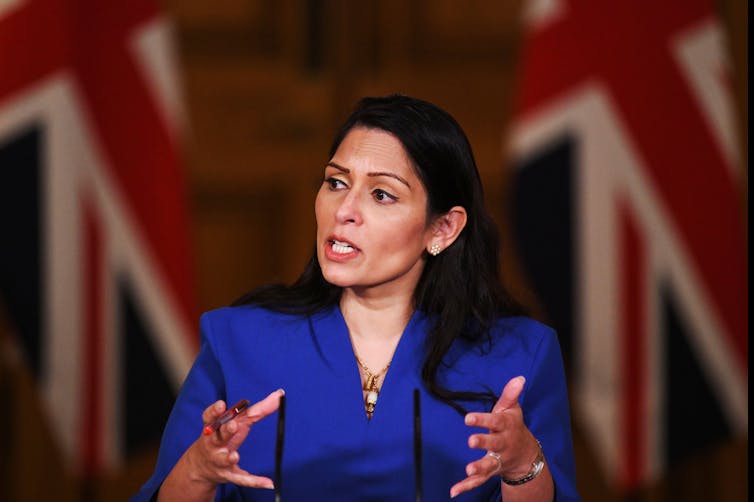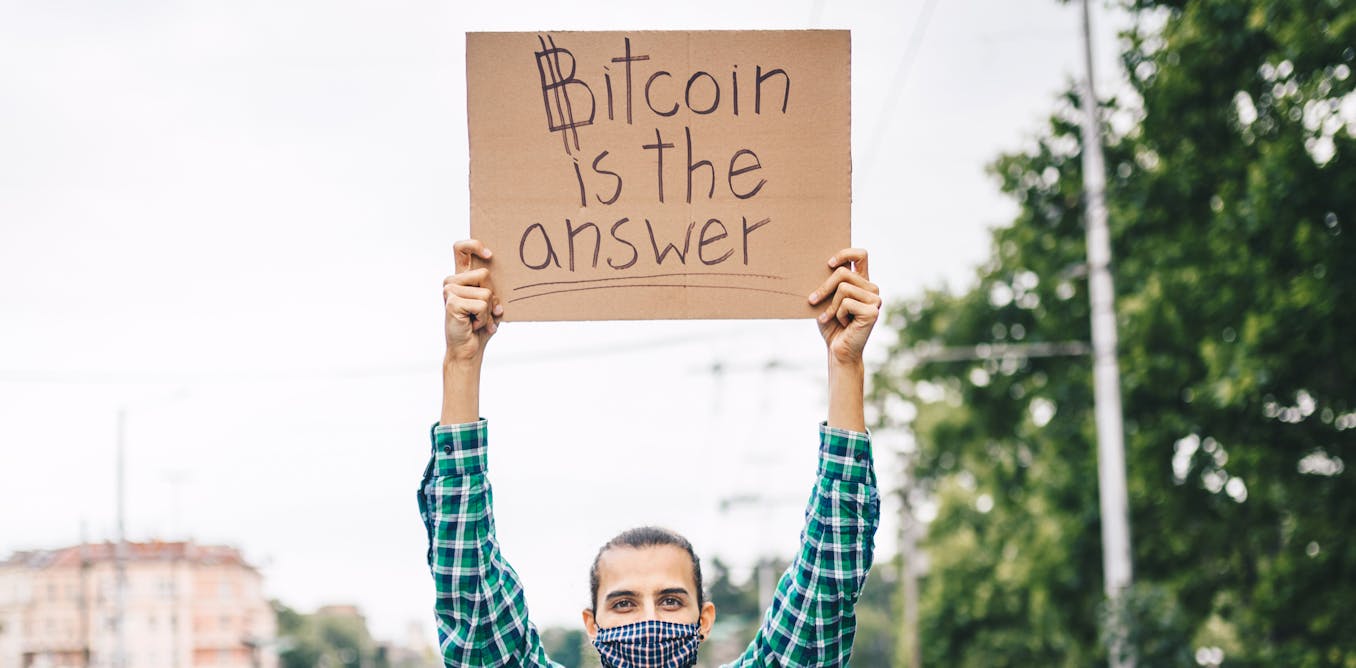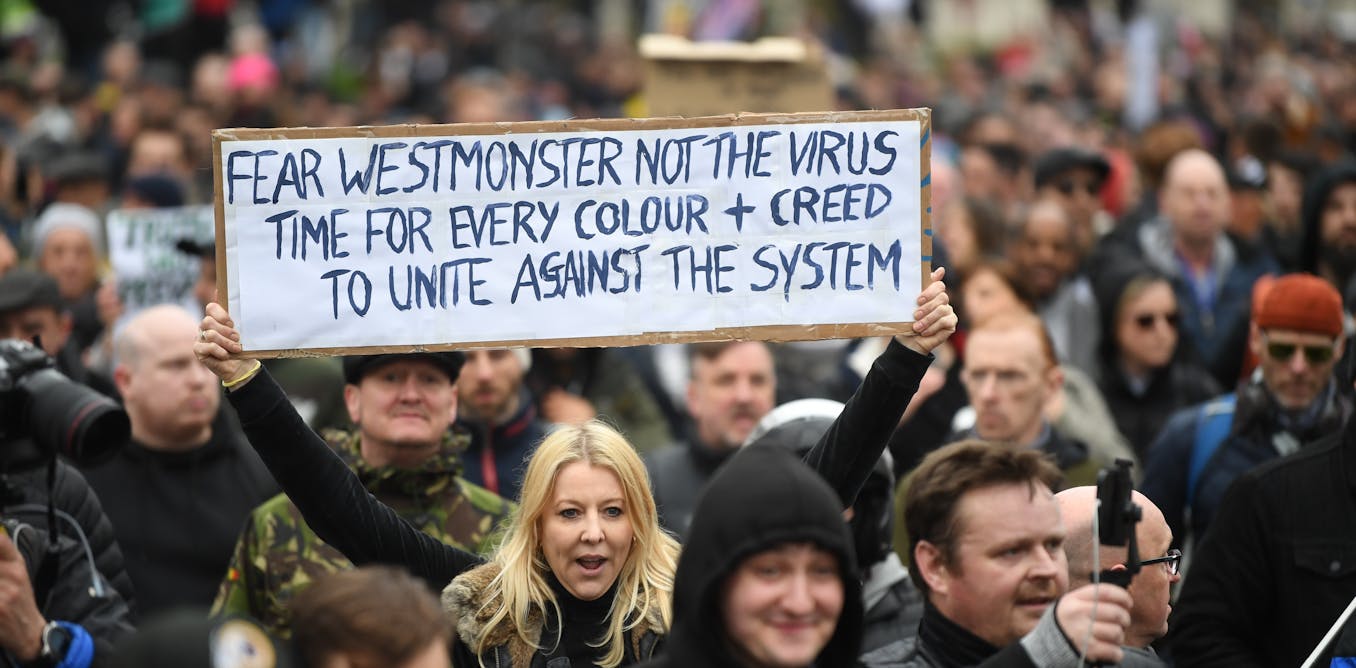Why Priti Patel’s plans to overhaul the asylum system make no legal sense

Helen O'Nions, Nottingham Trent University
In what’s been called the most significant overhaul to the asylum system in decades, Home Secretary Priti Patel has announced a number of controversial plans to deny refugees who use illegal routes to the UK universal rights to asylum.
Under the new plans, the home office has said it will “stop illegal arrivals gaining immediate entry into the asylum system if they have travelled through a safe country – like France”. Other measures include introducing “life sentences for people smugglers” and increasing “the maximum sentence for illegally entering the UK”.
These proposals to reform the asylum system with a focus on “fairness” are legally incoherent. As far back as 1999, former supreme court justice Simon Brown recognised that it was “well nigh impossible” for asylum seekers to enter the UK lawfully. Under the current rules, it’s not possible to apply for asylum until you arrive at the borders of the state you’re entering.
At that point the international obligation of non-refoulement operates, which means asylum seekers can’t be returned to their country of origin until their claim has been fully assessed and there’s deemed to be no risk of harm. The Refugee Convention, ratified by 145 countries, also prohibits turning away refugees who enter illegally, providing they can show they’ve come directly from a place of persecution and there’s good cause for their actions.
It’s very important to understand how “entering illegally” arises. Asylum seekers often struggle to obtain official identity documents from the state they’re being persecuted by, and can’t travel legitimately without such documents. Carriers’ liability legislation also penalises airlines, train operators and lorry drivers who assist unauthorised entrants, including asylum seekers.
So because it’s not possible to obtain an asylum visa to enter the UK or any other country, the only option for someone wishing to claim asylum is to engage in deception. Even those who intend to seek asylum after arriving through other legal migration channels (as students or visitors, for example) are defined as “illegal entrants” who have “exercised deception”. This “deceptive” entry then works to damage credibility, undermining asylum claims.
Under the UK’s Human Rights Act 1998, the state is obliged to prevent people from being returned to places of torture and inhuman and degrading treatment or cruel and unusual punishment. This obligation is absolute and applies without exception, which means the return of an asylum seeker whose case hasn’t been fully determined would be a clear violation of the Human Rights Act. This is well established by the case law of the European Convention on Human Rights.
The home secretary’s move to disregard that seems to suggest ignorance of the law. Her position also undermines the principle of hospitality that traditionally made the UK appear tolerant and welcoming for people who fear persecution. It’s this same perception that is one of the most common pull factors cited by asylum seekers who arrive in the UK.
Asylum applications in the UK
The rationale for the proposals is also questionable. There hasn’t been a significant increase in asylum applications over the last decade. And the UK receives less applicants than other European states of comparable size, with France and Germany receiving over four times the number of applications according to 2020 statistics compiled by the UNHCR. The number of arrivals in the UK in 2020 was actually down 18% on the previous year.
Around half of all asylum applications lead to protection in the UK. Before this right is recognised, however, many have to appeal, highlighting significant problems with first-instance decisions succeeding.
For nationals of some countries, including Iran, Syria, Vietnam and Eritrea, the refugee recognition rate is well over 70%. There’s a real risk of serious harm if people from these countries are returned (even in the event that return is considered a practical option), which suggests a genuine need for protection.
A broken system
The bigger problem is the asylum system itself. Since the Home Office abandoned its decision-making target of six months for straightforward applications, delays have increased significantly. Many people now wait over a year for their first substantive interview.
I recently spoke to a man who had been waiting for a full interview for 18 months and two claimants with fresh asylum claims who had been waiting for over two years for a decision. In those cases, it may be years before a final decision is reached, leaving people unable to work while those with a current asylum claim are expected to survive on £5 a day.
Due to the pandemic, many asylum seekers are also now confined in windowless hotel rooms without any cooking facilities, while others are detained in army barracks. But despite announcements to close the Penally Barracks in Kent after inspectors declared it “run-down and unsuitable” for accommodation, its sister site, which is also in Kent, has been revealed to have packed asylum seekers into dormitories. This has resulted in 197 cases of COVID-19 as well as protests in response to the inhumane conditions.
Last year’s independent review into the Windrush affair, in which large numbers of Commonwealth citizens were revealed to have been wrongly deported, denied rights or detained by the UK, explains a lot about existing shortfalls in the system. Authored by Wendy Williams, Inspector for Her Majesty’s Inspectorate Constabulary and Fire & Rescue Services, the review shed a great deal of light on the hostile environment and its impact on the asylum and immigration system.
In fact, this environment in which settling and remaining in the UK has been madde as difficult as possible for immigrants was identified as the source of many flawed) asylum and immigration policies, ranging from deportation of British citizens to refusal of life-saving medical medical treatment. Williams observed that there had been no significant change despite the home secretary’s paper commitment to address the damning findings.
This is the reality of the UK’s asylum system that the home secretary is refusing to acknowledge. Although strong reminders of the need to recognise these issues have come from far and wide, including the UNHCR and refugee charities (most of which have expressed complete dismay at Patel’s announcement), it seems the home secretary is adamant about pushing forward. Where evidence of fairness is in all of this remains to be seen.![]()
Helen O'Nions, Associate Professor, Nottingham Law School, Nottingham Trent University
This article is republished from The Conversation under a Creative Commons license. Read the original article.
What's Your Reaction?

























































